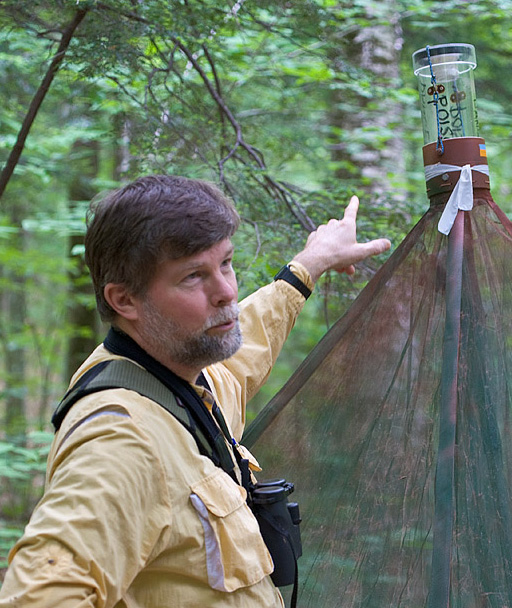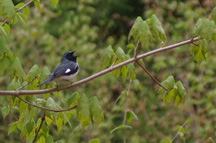In The Secret Life of Birds, Hearing Is Believing
Wellesley's Nicholas Rodenhouse Co-Authors Study Overturning Ornithological Thought
FOR IMMEDIATE RELEASE:
July 2, 2008 |
|
 |
In N.H.'s Hubbard Brook National Forest, Nicholas Rodenhouse uses traps to capture insects for bird food. He banded thousands of black-throated blue warblers to conduct his research. Click here to listen to the song of the black-throated blue warbler..
|
 |
WELLESLEY,
Mass. — Is seeing believing? Or is what’s overheard on the fly that counts?
When it comes to picking out a place to live, some songbirds eavesdrop on each other to make their minds up about where to raise a family — choosing what sounds like a great spot even when the nesting site is actually lacking in food and shelter.
These surprising findings suggest that songbirds have more complex communication abilities than had been previously understood, researchers say, and that “social cues” can be more important than the actual environment.
Nicholas Rodenhouse, a Wellesley College professor of biological sciences who studies migratory songbirds, is a co-author of a study just published in a professional journal, Proceedings of the Royal Society B, along with scientists from Oregon State, Queen’s and Trent universities. The researchers found that by playing the recorded songs like those of successful black-throated blue warbler parents, younger birds would take up residence in an area they otherwise would have avoided.
Rodenhouse said even though younger birds have the choice of independently looking around and assessing a nesting site, they take a short cut: listening to what older birds have to say.
“Song is actually more important to birds than the habitat itself, which completely overturns 30 or 40 years of ornithological research,” Rodenhouse said. “Songs override habitat cues. Birds are paying attention to the song, and not the shrubs. It took an experiment including a gradient of habitat quality, and the presence or absence of song, to reveal which cues matter most to birds.”
For the first time, the researchers also found that this information gets passed along in the fall, not the spring. First-year birds heading south for the winter overhear successful older birds singing to their babies. The younger birds remember that area the following spring when they return to establish their first nests. They settle down in an area that apparently produced good results for other birds.
“We banded literally thousands of young birds,” Rodenhouse said, “birds that are actually hearing the (species) song for the first time, since they were born that year. They are checking out the space and thinking ahead to the next nesting season. They are going to fly south, and when they come back, they are going to come back to where they heard that song.”
“Song is actually more important to birds than the habitat itself, which completely overturns 30 or 40 years of ornithological research."
— Nicholas Rodenhouse |
The experiment, in which recorded songs were played in every kind of habitat from good to extremely poor, proved that it’s not what birds see as much as what they hear about a good neighborhood. That changes the way scientists understand about how birds chose breeding habitats and how they communicate.
Since only about half of migratory birds survive to return to the same nesting spot from year to year, these younger birds can often find available real estate the following spring. And there’s a second bonus: Single males may find more available females in a site where successful parents congregate.
“Roughly 20 to 40 percent of the eggs in a nest will be fathered by a male other than the territorial male,” Rodenhouse said. “So if you are next door to a really sexy female, you haven’t lost all hope.”
Choosing a good nesting site is of the utmost importance for birds’ survival, the researchers say. Getting something like this wrong could be disastrous.
“The common wisdom is that these birds select sites solely on vegetation structure,” said Matthew Betts, the lead researcher, an Oregon State assistant professor of forest science. “If a bird selects a site for its nest that doesn’t have the appropriate cover and food supply, it most likely won’t be able to successfully breed. But now we know that young birds can listen to the songs of more experienced and successful birds and use this to help decide where they will nest for the next year.”
The research was done at 54 sites in and near the Hubbard Brook Experimental Forest, an 8,000-acre site located in the White Mountain National Forest in New Hampshire, where Rodenhouse has conducted research for more than 20 years.
While study was done with a single species of songbird, the researchers say the findings are probably relevant to at least some other songbirds and perhaps other animal species as well. Although animal communication is not well understood by scientists, studies such as this show that animals are talking to each other and passing on information of great significance.
The ability to communicate may be useful in the face of climate change or other changing habitat conditions, the researchers said. If birds can simply listen to vocal cues and make rapid decisions about something as important as future nesting sites, they may be able to respond more quickly to environmental conditions without having to experience them personally.
“If a bird can fly over a broad area and, just by listening to songs, identify 10 good places to nest, there’s a real value to that,” Betts said. “With little energy, the songbird has found a successful place to rear its young, just by listening to other birds sing about their parental success.”
The field holds much promise for new research, Rodenhouse said.
“For anything that’s vocal, has a spatial pattern in its reproductive success, and public information that can be gleaned by an animal whether it’s migratory or not, you should be able to use that same kind of information,” he said. “But that’s speculation until someone goes out and tests it.”
Rodenhouse noted that the ability of birds to listen to others’ success stories is not too far removed from human beings who read a newspaper or search the Internet to discover a good neighborhood, rather than scouting out a place and figuring it out for themselves.
“You might look at housing prices and school quality, and you’d probably use publicly available information,” he said. “You are not going to sit in a grade-school classroom and say, ‘Hmm, how is that teacher?’ You are going to find information that tells you that these schools are good and these others are bad. It turns out that making these personal assessments of habitat quality, particularly in a variable environment, are usually bad personal assessments.”
Experience takes a long time to develop, he added, and if you are songbird, life is particularly short.
“You get one or two possibilities of breeding,” Rodenhouse noted, “so you had better make the right choice the first time.”
Since 1875, Wellesley College has been a leader in providing an excellent liberal arts education for women who will make a difference in the world. Its 500-acre campus near Boston is home to 2,300 undergraduate students from all 50 states and 68 countries.
###
|

